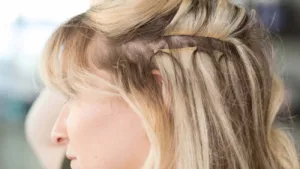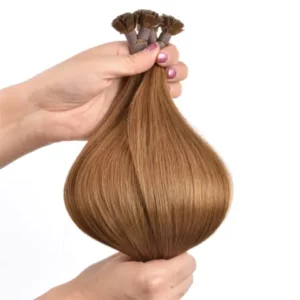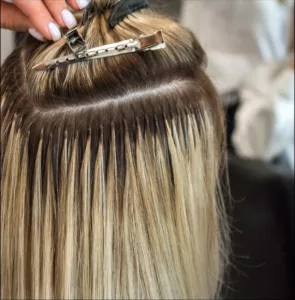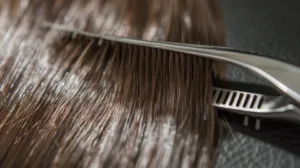Have you heard of genius weft and machine weft but feel unsure about what makes them different? Many salon owners and stylists ask which one is better, more cost-efficient, or more suitable for different clients. The truth is, both wefts have unique strengths and serve different business needs.
Genius weft is ultra-thin, handmade with a complex process, and more comfortable but costly. Machine weft is dense, faster to produce, affordable, and ideal for heavy coverage. The difference lies in production, thickness, and salon application needs.
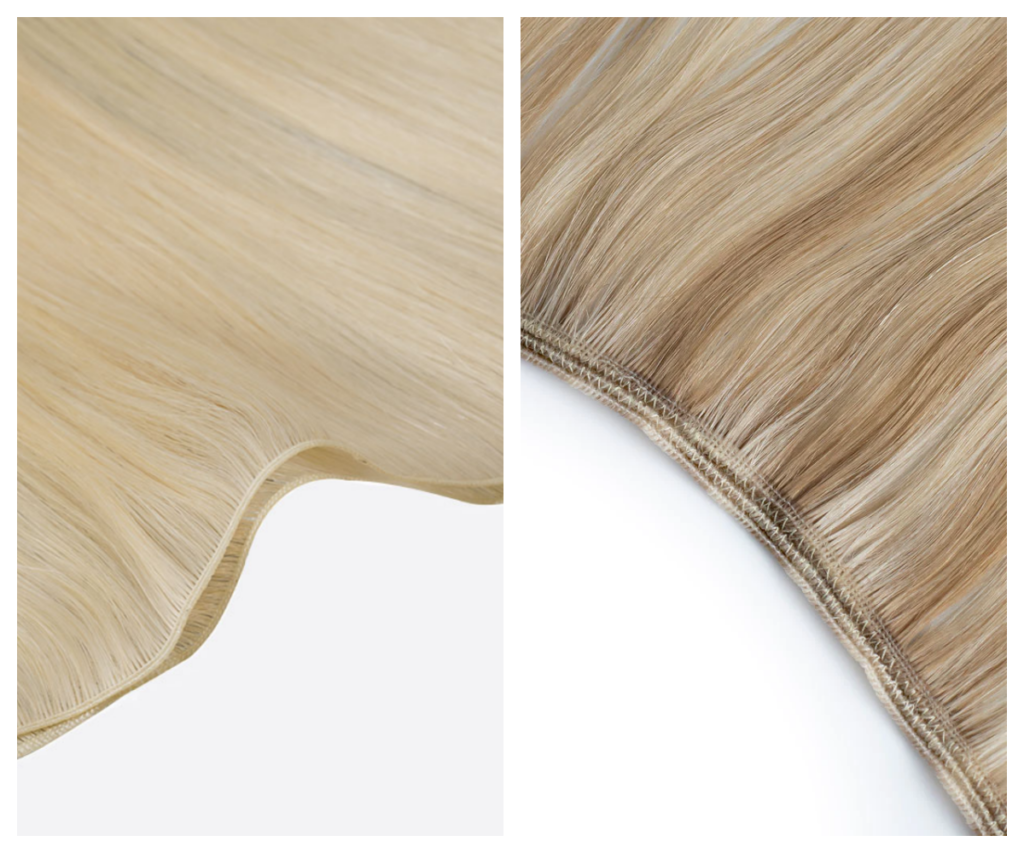
This article will break down both types, their pros and cons, their similarities, and how to choose wisely. By the end, you will know exactly which weft to stock for your clients.
What is Machine Weft?
Machine weft has been in the industry for decades and remains the standard for many salons and wholesale buyers.
Machine weft is made by sewing hair with an industrial machine, creating a strong seam with more density. It is simpler and faster to produce, which makes it more affordable.
Definition and production
Machine wefts are produced by sewing strands of hair into a seam with a specialized machine. The process is straightforward and fast, which reduces production costs. A single strip of machine weft carries more grams of hair, making it easier to build volume and length with fewer rows.
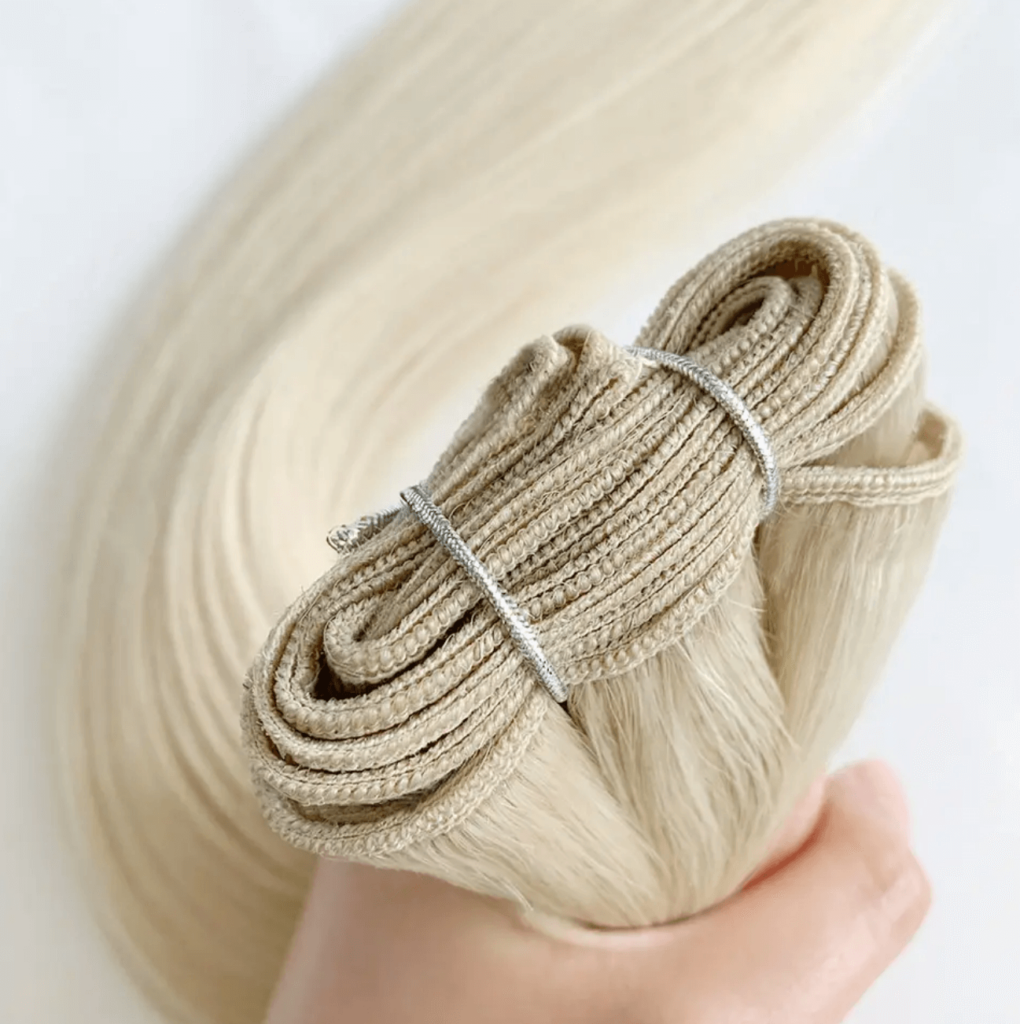
Why it costs less
Because machine production is efficient, factories can create machine wefts in bulk quickly. There is less human labor, which lowers cost. For salons, fewer bundles are required to achieve a thick look, meaning installation is faster and cheaper compared to genius wefts.
Pros of machine weft
- Dense, full coverage with fewer bundles
- Durable and strong seam
- Affordable price point
- Can be cut without excessive shedding (if well-made)
Cons of machine weft
- Thicker seam, less discreet than genius weft
- Return hairs can cause scalp irritation
- Slightly bulkier feel under natural hair
| Attribute | Machine Weft Performance |
|---|---|
| Seam thickness | Medium to thick |
| Cutting ability | Cuttable without shedding (good seam) |
| Comfort | Medium (return hairs present) |
| Density per strip | Higher, fewer bundles needed |
| Cost | Lower due to simple machine process |
What is Genius Weft?
Stylists often face challenges when clients want discreet extensions that blend seamlessly. Genius weft was developed as an upgrade to solve these issues.
Genius weft is a micro-thin extension weft with no return hairs, cut-anywhere flexibility, and a handmade production process. It is known for being soft, invisible, and premium.
Definition and production
Genius weft is designed to be thinner than traditional machine wefts. Each strand is carefully processed, with many steps done manually. The edge of the weft is slim and flat, making it undetectable under natural hair. Unlike machine wefts, it has no return hairs, so the scalp feels smooth and comfortable.

Why it costs more
The price of genius weft is higher because the manufacturing is complex and labor-intensive. Workers must carefully align, sew, and seal each strand. This process takes longer and requires skilled labor, which increases the cost. For clients, achieving the same fullness as a machine weft usually requires more bundles of genius weft. That also means installation takes more rows and salon labor time, raising the service cost.
Pros of genius weft
- Ultra-thin and flexible
- No return hairs → maximum comfort
- Can be cut anywhere without fraying
- Discreet, seamless finish
Cons of genius weft
- Expensive raw cost due to production process
- Needs more bundles for fullness → higher installation cost
- Lower density per strip compared to machine weft
| Attribute | Genius Weft Performance |
|---|---|
| Seam thickness | Ultra-thin, flat |
| Cutting ability | Cut anywhere, no unraveling |
| Comfort | High (no return hairs) |
| Density per strip | Lower, needs more bundles |
| Cost | Higher due to complex manual process |
What is the difference between genius wefts and machine wefts?
Stylists and wholesalers often compare the two directly. The difference is not just in thickness but also in production method, cost, density, and installation requirements.
Genius weft is thinner, softer, and more comfortable but expensive due to manual production. Machine weft is dense, affordable, and requires fewer bundles, but it is thicker and less invisible.
Dive deeper
Core differences
- Production: Genius = handmade, labor-intensive. Machine = machine-sewn, fast and simple.
- Cost: Genius costs more because of complex processing. Machine is more affordable.
- Density: Genius has less hair per strip, requiring more bundles. Machine is heavy per strip, faster to install.
- Comfort: Genius has no return hairs, very smooth. Machine has return hairs, can feel itchy.
- Appearance: Genius lies flatter and more discreet. Machine is thicker but still durable.
| Feature | Genius Weft | Machine Weft |
|---|---|---|
| Production | Manual, labor-intensive | Machine, simple, fast |
| Seam thickness | Ultra-thin | Medium–thick |
| Density per strip | Lower, needs more rows | Higher, fewer rows |
| Comfort | Very high (no mustache) | Medium (return hairs) |
| Cost | High | Lower |
| Service fees | Higher (more rows) | Lower (fewer rows) |
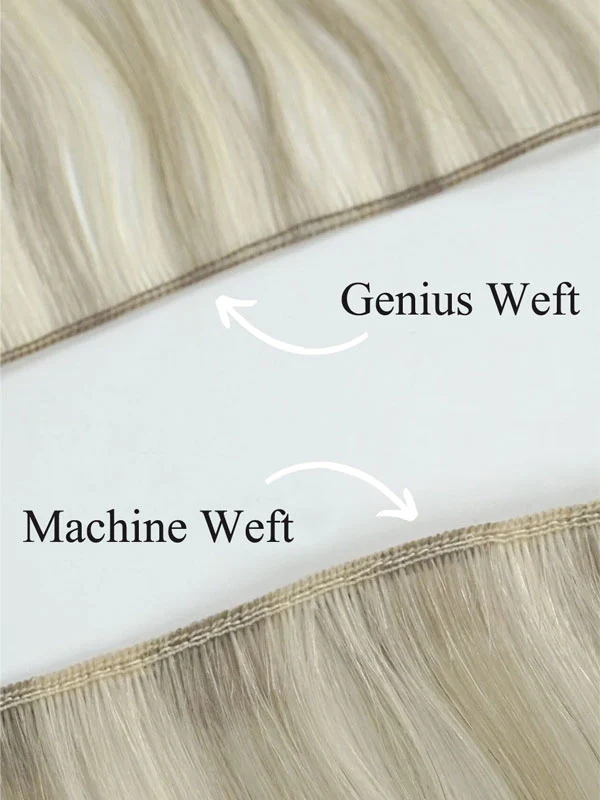
What are the similarities between genius wefts and machine wefts?
While the two wefts differ in production and density, they share several similarities that matter for both stylists and clients.
Genius wefts and machine wefts are both hair extension wefts, can be cut without shedding, and require regular maintenance and move-up appointments.
Dive deeper
Key similarities
- Both belong to the weft category of extensions. They are sewn or beaded into natural hair in rows, making the installation method generally similar.
- Both types can be cut to fit the head size without shedding if the seam is constructed properly.
- Both need regular move-up appointments every 6–8 weeks, depending on hair growth.
- Both require proper care, including gentle washing, detangling, and avoiding heat near the seam.
- Both can last many months to a year if made with full cuticle hair.
These common traits remind salon owners and stylists that both wefts are professional-level products. The real difference lies in price, density, and client preference.
Genius weft or machine weft, how to choose?
The choice depends on the client’s expectations, budget, and the salon’s service model.
Choose genius weft for premium clients who want comfort, invisibility, and luxury. Choose machine weft for clients who want high density, fast results, and cost efficiency. Many salons combine both in different services.
Dive deeper
Guidelines for choosing
- Client budget: Luxury clients → genius weft. Cost-focused → machine weft.
- Desired look: Natural, seamless blending → genius weft. Thick, dramatic volume → machine weft.
- Installation time: Quick installs → machine weft. Detailed customization → genius weft.
- Business model: Premium boutique salons → genius. High-volume salons → machine.
Hybrid use is common. Some salons install machine weft for bulk length at the bottom and genius weft for the top rows to achieve comfort and invisibility.
My opinion
From a factory and wholesale perspective, both are valuable. Genius weft fits salons aiming at luxury services and high-spending clients. Machine weft is practical, fast, and affordable, making it perfect for bulk orders and clients wanting heavy density. Successful salons often stock both, giving stylists flexibility and ensuring they meet every client’s needs.
FAQ
Q: Why is genius weft more expensive than machine weft?
A: Because the production process is labor-intensive and requires more manual work. It also needs more bundles for fullness, increasing both product and service cost.
Q: Does machine weft shed when cut?
A: No, if the seam is well-constructed. Quality machine wefts can be cut without significant shedding.
Q: Is genius weft better than machine weft?
A: Not always. Genius weft is better for fine hair and luxury installs. Machine weft is better for thick hair, dramatic looks, and cost efficiency.
Q: How many rows of genius weft are needed compared to machine weft?
A: Usually more rows. Machine weft is denser, so fewer strips cover the same head. Genius weft often requires multiple bundles for similar volume.
Q: Which lasts longer?
A: Both last 9–12 months if made with full cuticle hair. Longevity depends on hair quality, not the weft type.
Q: Which is more comfortable for sensitive scalps?
A: Genius weft, because it has no return hairs and lays flatter against the head.
Q: Can salons charge more for genius weft installation?
A: Yes. Since more rows and time are needed, service fees are naturally higher.
Q: Which is better for wholesale bulk orders?
A: Machine weft is more cost-effective, easier to stock in volume, and faster to produce.
Q: Can both wefts be reused?
A: Yes, with proper removal and care, both can be reused multiple times.
Q: Are both wefts suitable for all hair types?
A: Yes, but genius weft is ideal for fine to medium hair, while machine weft is better for medium to thick hair.
Q: Do clients notice a big difference?
A: Yes. Clients with sensitive scalps usually prefer genius weft. Clients who want dramatic length and fullness often prefer machine weft.
Q: Do both require maintenance?
A: Yes, both need move-up appointments every 6–8 weeks to maintain a clean and natural look.
Conclusion
Genius weft vs machine weft comes down to comfort versus density. Genius offers luxury and invisibility at a higher cost, while machine weft delivers volume and affordability. Smart salons stock both to meet every client’s need.
Hibiscus Hair Manufacturer has been dedicated to producing high-quality hair extensions for 25 years and is a recognized leader in the industry. If you are interested in finding a reliable hair extensions supplier and wholesale for your brand, please visit our website for more information:
HOME

